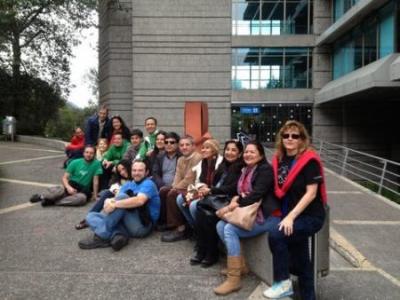S-CAR Workshop in Bogota, Colombia: Conflict Resolution in the Exploitation and Management of Natural Resources
S-CAR Workshop in Bogota, Colombia: Conflict Resolution in the Exploitation and Management of Natural Resources
 The tenth Summer Workshop on Conflict Resolution in Latin America and the Caribbean was held in Bogota, Colombia between June 5th and 13th 2014, in partnership with the School of Political Science and International Relations of the Pontificia Universidad Javeriana. The activity was organized by the Latin American Initiative at the Center for Peacemaking Practice.
The tenth Summer Workshop on Conflict Resolution in Latin America and the Caribbean was held in Bogota, Colombia between June 5th and 13th 2014, in partnership with the School of Political Science and International Relations of the Pontificia Universidad Javeriana. The activity was organized by the Latin American Initiative at the Center for Peacemaking Practice.
As in previous years, the Workshop was supported by travel scholarships from the Organization of American States, who paid the cost of travel for four of the workshop participants. The course was taught by three Latin American professionals and three faculty members from S-CAR, together with colleagues from the Pontificia Universidad Javeriana (PUJ) who were also responsible for organizing the event locally.
Fifteen participants from ten countries in Latin America prepared and sent in advance a summary of a case they were either working on or were familiar with in the management or exploitation of natural resources. The sharing of cases brought a wealth of information to the group, whose members could see the similarities and differences among the countries.
The participants were organized and worked in four groups. On June 12th, each group presented its cases, showing the process of mapping, timeline, analysis of multiple actors and their roles, diagnoses and intervention designs. Cases included oil and mining exploitation, forestry, water supply, and eolic energy development. Several cases were located in indigenous areas, presenting added ethnic and cultural variables to the conflicts.
After the workshop, participants are keeping in touch with each other to further support their work. They have signed up at the S-CAR’s Red Latinoamericana site in Facebook, where they can all see the postings from the Latin American Initiative, as well as post their own announcements and questions. In addition, participants received contact information of all professors for further consultations.
The mix of members from ten countries, different professions (engineers, architects, science professors, geologists, architects, and social scientists) was a very positive aspect of the workshop, as was the mix of private sector, government, and NGOs representatives. The experience widened their perspective to allow them to see beyond their own point of view. As one participant put it, they received “a bath of humility.” It was gratifying for the professors to see the transformation of participants throughout the eight days.




